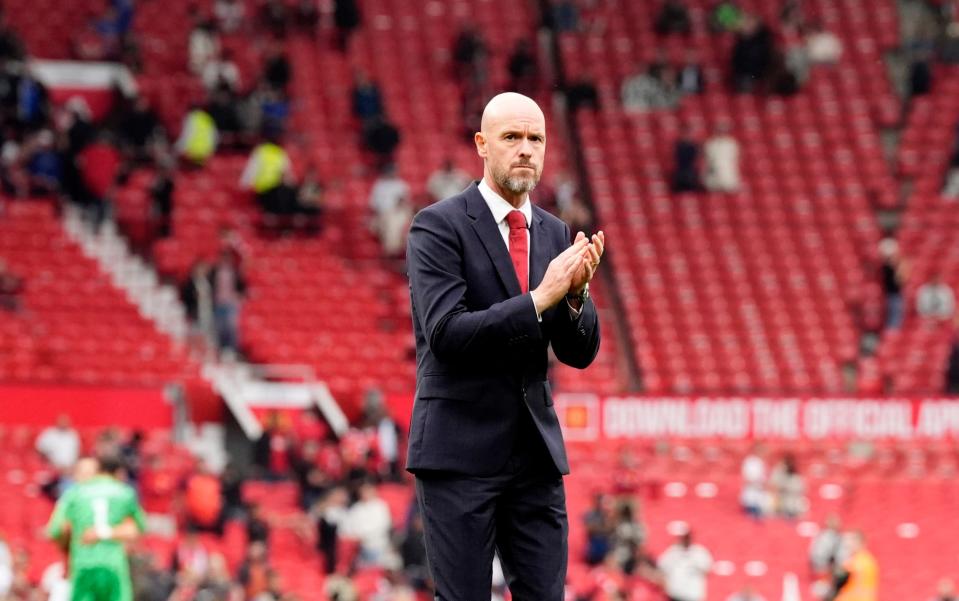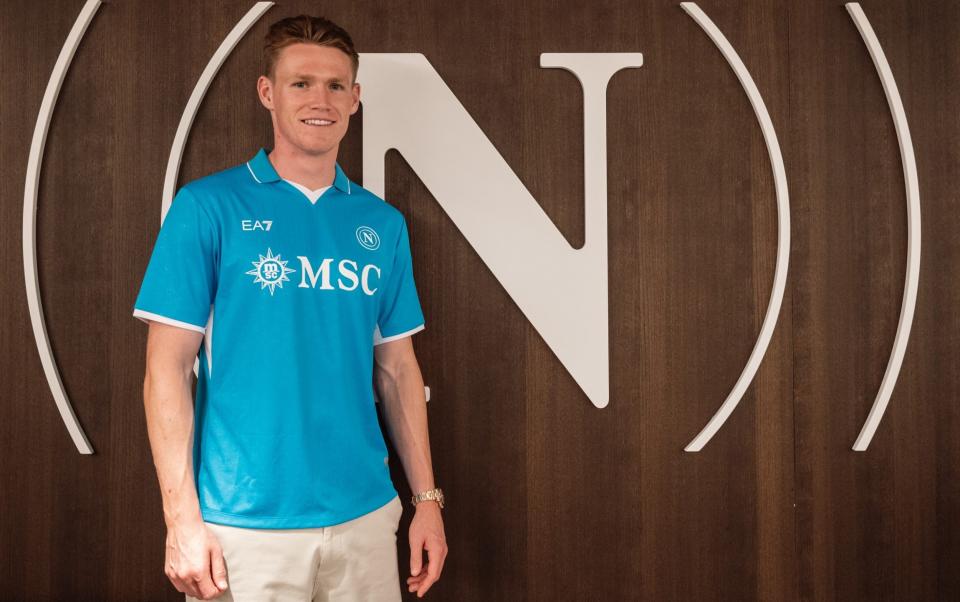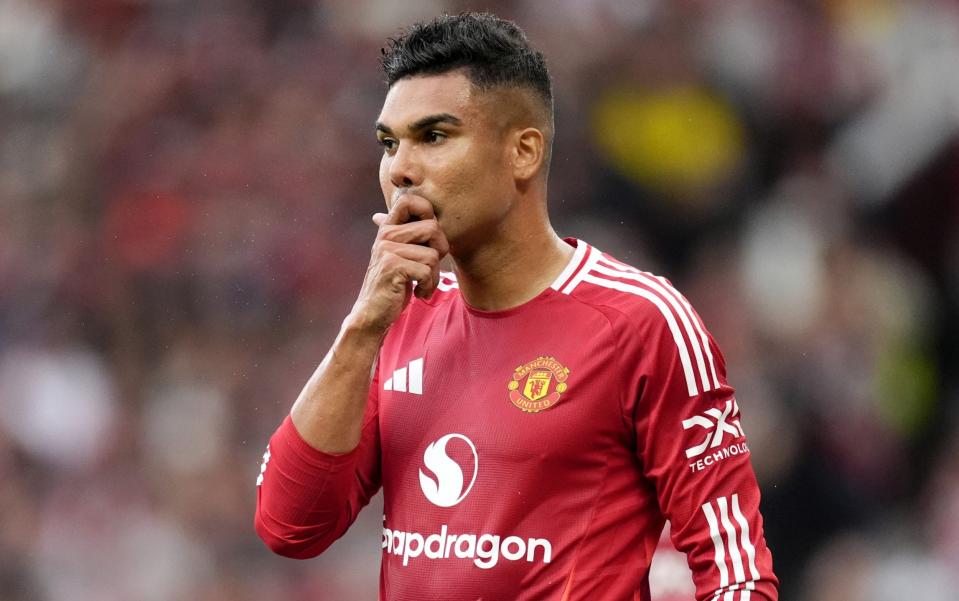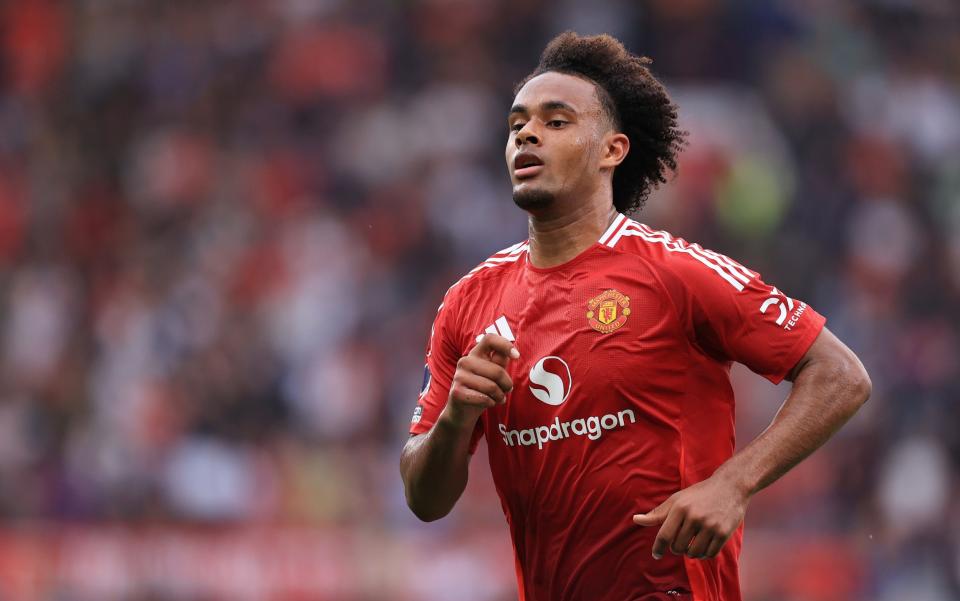Decisive moves and squad streamlining: Inside the Ashworth/Berrada plan to fix Manchester United

Omar Berrada and Dan Ashworth have spoken publicly to the national media for the first time since being appointed as Manchester United’s chief executive and sporting director respectively in July. From the future of manager Erik ten Hag and their first summer transfer window in charge to the battle to get United back on top and their ambitions for the future, Telegraph Sport breaks down what they said.
Ten Hag’s future
United’s season is only three games old but successive defeats have already put Ten Hag’s future back under scrutiny and cranked up the pressure on the manager before the trip to Southampton on Sept 14. The manner of United’s abject 3-0 defeat by Liverpool at Old Trafford on Sunday as much as the result itself again raised serious questions about the team’s set-up under the Dutchman, who bristled at a reporter for asking if his coaching was the problem rather than the players.
United spoke to at least six managers, including Thomas Tuchel, Roberto De Zerbi, Thomas Frank and Kieran McKenna, before deciding to trigger a one-year extension option in Ten Hag’s contract in July rather than award him a new deal, in part as a result of their impressive FA Cup win over Manchester City and the groundswell of support among fans to keep him. It did little to discourage the belief in some quarters that the decision to keep Ten Hag was more a marriage of convenience than anything else and that, if the right candidate had been available, they would have made a change. But Berrada has insisted Ten Hag has the new Old Trafford’s hierarchy complete support. “We think Erik is the right coach for us and we’re fully backing him,” he said.

Sancho’s exit
Jadon Sancho joined Chelsea on a season-long loan on deadline day and the west London club will be obliged to buy the England winger for a minimum fee of £20 million if they finish in the top 14 of the Premier League this season. Sancho’s departure came seven weeks after he returned to training with United after agreeing a fragile truce with Ten Hag, even though the player did not apologise for effectively accusing his manager of lying over the reasons for his absence against Arsenal 12 months ago.
Ashworth said Sancho left because he favoured a move away and that the same was true for Scott McTominay and Aaron Wan-Bissaka, who joined Napoli and West Ham United respectively. Asked if Sancho exited because there was no future for him at Old Trafford under Ten Hag, Ashworth said: “Nothing to do with that. It was a decision that we made – if it’s right for Jadon and it’s right for us to move on. He wanted to explore the opportunity at Chelsea, like Scott wanted to explore the opportunity at Napoli and Aaron at West Ham. We’re not in a position where we’re kicking players out of the club.

“I think with any player, whether it’s Jadon, Scott, Aaron, if there’s a preference that they would like to move and go to a new club and it’s right for them and it’s right for us, then you have to explore it. We felt we had enough depth in that particular position to be able to cover it. We’ve got four really good wide players, Jadon was a fifth, and it just enabled us to make that decision that if it was good for him and good for us it was something we were willing to consider.”
Transfers
This summer window represented something of a departure for United after years of being accused of stockpiling players and not being ruthless enough. Almost £110 million was raised in sales, including add-ons, with Ashworth admitting it was crucial the club were “brave” in their decision-making and avoided being left with a bloated squad that could cause problems.
“Sometimes you have to be quite brave and make decisions that maybe you don’t want to make, but you can’t have a bloated squad,” he said. “So you want to make sure that the squad is lean, but you have enough depth. We wanted to make sure we’re able to keep the players with the motivation and thought that they’ve got a chance of playing. If you run with too big a squad, it can cause problems.”
Ashworth said he “liked the squad” but said he had never presided over a window “where we’ve gone: ‘Oh God, it’s gone absolutely perfectly’”. For example, United wanted to offload Casemiro, who was largely culpable for Liverpool’s first two goals on Sunday, but found no takers for the Brazil midfielder.

Ashworth also stressed the importance of extending captain Bruno Fernandes’ contract after the Portugal midfielder had raised doubts about his future at the end of last season. “Bruno’s been brilliant since he’s been here,” Ashworth said. “His game availability is fantastic, his output is brilliant, the influence he brings to the other players as captain, I can’t speak highly enough of him. It was a crucial part of the transfer strategy as well.”
The ‘Dutch’ influence
United faced criticism for allowing Ten Hag such sway over transfers during his first two summers in charge, when he signed a number of players from his former club Ajax or who had Dutch links. Even this summer, when Ten Hag had input over buys but not to the same extent as before, United signed two of his former Ajax players in Matthijs de Ligt and Noussair Mazraoui plus the Netherlands striker Joshua Zirkzee.

But Ashworth gave short shrift to the idea that nationality had any influence over their decisions. “I can’t comment on what’s happened previously but we looked at objective subjective opinions and came up with the best possible solution we could to fill the positions we identified,” he said. “To work with somebody you’ve worked with previously in all contexts … that is a natural sway because you know that person, because you know that player, but also we’ve signed a number of players this summer that haven’t worked with Erik previously: [Leny] Yoro, [Manuel] Ugarte, he’d never worked with Zirkzee – and you can’t say just because he’s Dutch he knows him. That would link the whole of the English market to me!”
PSR’s threat to the ‘one-club man’
Although Berrada said United were in favour of the “fundamental principle” of the Premier League’s profit and sustainability rules, Ashworth admitted the regulations have made it more appealing financially to sell homegrown talents, which in turn means fewer players are likely to spend their entire careers at one club and academy graduates sold more plentifully. Ten Hag said he would have preferred not to lose McTominay but, with no takers for Casemiro this summer, the Scotland international’s departure after 21 years at Old Trafford was the only way United could finance a move for Manuel Ugarte. “I don’t want to sit here and say no player is going to be a one-club person again,” Ashworth said. “But the rules have, as an unintended consequence, made it slightly more attractive to sell players with a zero-book value, which is consequently either players you sign on a free or players that come through your system.”
Catching Manchester City
Berrada said it was “almost impossible” to put a timescale on how long it will take for United to be in a position to be consistently challenging for Premier League and Champions League titles again. But he insisted it was not enough for United to be intermittently successful. “We don’t want to just win one Premier League and then be satisfied,” he said. “We want to create a team that is capable of competing for the Champions League, for the Premier League and for the domestic cups on a consistent basis. So to build that, we need to be doing more of what we have done in this window.”
Telegraph Sport has reported previously how United are taking a 10-year view in terms of their desire to become a dominant force in England and Europe again, even if there is hope that after another couple of summer windows they will be better positioned to challenge for the title. “What I can say is it has been demonstrated when you look at the teams who have been successful consistently for many years it’s because they have the right coach, they have signed the right players, they have the right structure around the coach and the players,” Berrada said. “You need to take good decisions consistently for many years to get into a position where you are a financially sustainable club that is competing to win every single competition. Which is where we want to be.
“I’m very excited and very optimistic at what we have in front of us. I think we’re starting to put the right pieces in place and I’m absolutely convinced that we’re going to be successful.”

